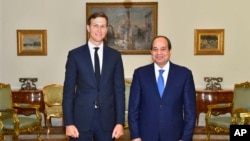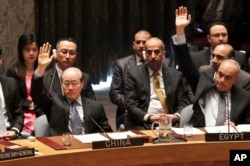U.S.-Egypt ties, which had improved under President Donald Trump, appeared strained Wednesday after the U.S. withheld some aid to Egypt over human rights concerns.
The U.S. cut nearly $100 million in economic and military aid, and delayed nearly $200 million more in military financing to Egypt, one of the largest recipients of U.S. foreign aid.
U.S. officials, speaking on background, cited Egypt's failure to make human rights improvements or relax harsh restrictions on civic and other non-governmental organizations.
Cairo's foreign ministry slammed the decision, calling it a "a misjudgment of the nature of the strategic relations that binds the two countries over decades."
Egypt was also reported to have canceled a meeting between visiting White House advisor Jared Kushner and Egypt's foreign minister Sameh Shoukry.
But Egypt's foreign ministry later released a video via Twitter of Kushner and his team meeting with Shoukry, with both delegations smiling for the cameras and laughing.
Kushner, Trump’s son-in-law, is in Cairo as part of an effort to revive Mideast peace talks.
He also met Wednesday with Egyptian President Abdel Fattah el-Sissi. A statement from Sissi’s office did not mention the aid cuts. It highlighted Egypt’s desire to work on strengthening relations between the two countries.
Trump has embraced Sissi as a key partner in the global war against Islamist extremism, downplaying concerns over his human rights record. During an April meeting at the White House, Trump was effusive in his praise for Sissi.
"I just want to let everyone know, in case there was any doubt, that we are very much behind President el-Sissi," Trump said. "He's done a fantastic job in a very difficult situation."
Analysts surprised
In dealing with Egypt, Trump is juggling multiple priorities, including laws that prohibit the U.S. government from providing foreign aid to institutions or individuals that commit human rights violations.
Another factor: Trump has also suggested massive cuts to the overall U.S. foreign aid budget, insisting the U.S. should instead use that money to build up its own military.
Still, many analysts were surprised by the U.S. decision.
“Given Trump’s public statements on President Sissi and the unimportance of human rights in the fight against terrorism, I thought the aid would flow normally," said Timothy Kaldas, a Cairo-based non-resident fellow at the Tahrir Institute for Middle East Policy.
"That said, it does seem that different parts of the administration are quite out of sync on foreign policy. The Qatar crisis showed that clearly," he said.
Tom Malinowsky, who served as assistant secretary of state for human rights under former President Barack Obama, praised the decision.
“It would have been nearly impossible to justify giving Egypt this money," Malinowsky told VOA. "(U.S. Secretary of State Rex) Tillerson has invited contempt before by doing unjustifiable things, but perhaps they are learning a lesson.”
Sissi, a former military leader, helped oversee the dispersal of protesters in 2013, which Human Rights Watch termed "one of the world's largest killing of demonstrators in a single day in recent history."
Following the crackdown, the administration of former President Barack Obama temporarily froze some military assistance to Egypt, but eventually restored it.
North Korea a factor?
U.S. officials have also long been frustrated by Egypt's civilian and military links to North Korea, which is developing a nuclear and missile program in violation of United Nations sanctions.
According to a White House readout of a July phone call between Trump and Sissi, the two leaders discussed "the need for all countries to fully implement U.N. Security Council resolutions on North Korea, stop hosting North Korean guest workers, and stop providing economic or military benefits to North Korea."
The Trump administration has made isolating Pyongyang a top foreign policy priority.
White House officials did not return VOA's requests for comment.
Rights group react
Rights groups welcomed the U.S. decision to withhold aid, but some were quick to make a distinction between the U.S. provision of economic and military assistance to Egypt.
"Amnesty International does not oppose or support economic, educational and academic aid by the U.S. to Egypt and we do not have a position on this," said Mohamed Ahmed, Egypt researcher at Amnesty International.
"However, Amnesty International calls on the U.S. government to impose a suspension on the transfer of any arms, that is part of the military aid, of the types that can be used to commit or to facilitate human rights violations," he said.
Specifically, Ahmed cited the Humvee four-wheel-drive vehicles transferred by the U.S. government which he says were recently used to facilitate extra-judicial executions by Egypt's military in the Sinai Peninsula.
In a statement to VOA, Human Rights Watch said it encourages all states, including the U.S., to "suspend all military and police aid and trainings with government of Egypt until a clear, transparent investigations take place in the several incidents of terrible violations that occurred over the past four years, including extra judicial killings, enforced disappearances and mass killing of protesters."
"Until such investigations happen and perpetrators are held accountable, we think that providing military aid to the Egyptian government risks complicity in these abuses," Human Rights Watch said.












